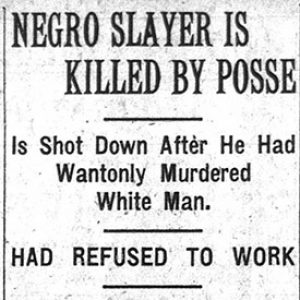calsfoundation@cals.org
Owen Flemming (Lynching of)
On June 8, 1927, a mob murdered Owen Flemming, an African-American man, near Mellwood (Phillips County). At the time of the lynching, Arkansas was experiencing unprecedented flooding. The Flood of 1927 remains the most destructive in Arkansas history, covering about 6,600 square miles and inundating thirty-six of the state’s seventy-five counties. Many black citizens who lived along the Mississippi River and other flooding waterways were forced to work on the levees, often at gunpoint.
One of these forced workers was Owen Flemming (or Fleming, according to some accounts). There is little information available about Flemming, but he is described in several articles as a “prominent black man.” According to the Arkansas Gazette, however, Flemming had a bad reputation. Officials at the Barton (Phillips County) refugee camp described him as “a bad negro, continually shirking work.”
Accounts of the incident vary. According to the Arkansas Gazette, Flemming was in a boxcar near one of the work sites. Roy Waters, the overseer on the J. H. Woods plantation at Mosby Spur, sent another worker to fetch Flemming to work. This attempt having failed, Waters went himself, and Flemming shot him in the heart with a double-barreled shotgun. Flemming then jumped from the car, took Watson’s pistol, and shot him twice more. He fled down the railroad tracks and hid in a nearby tent. There, a posse surrounded him; he surrendered and was shot. The local Helena World newspaper reported that Waters’s “wife and baby were summoned to the scene before the posse fired into the Negro’s body.”
The Pittsburgh Courier, one of the best-selling African-American newspapers in the country, published a somewhat different account that expands on the information above. According to the Courier’s story, following the flood, local law enforcement arrested every African American found on the streets and forced them to work on the levees without pay: “Many of the business men, doctors, and leading preachers were forced to go down on [the] levee to work and not allowed to change their clothing and put on working clothing. They were forced to work without food and at the point of a shot gun.” For example, in a black section of Helena (Phillips County), which was called the Walker Levee Addition, two policemen entered an African-American church, interrupted the service, and forced all of the men in attendance to go to work on the levees. Others were taken from their homes late at night. According to the Courier, “None of the white business men, nor professional men, were forced to do anything on the levee, although some of them volunteered to go down and help force the Negroes to work with the aid of a shot gun.”
According to the Courier’s account, when Roy Waters, overseer on the J. H. Woods plantation, ordered Flemming (who was already being forced to work on the levee) to go down into the flooded area and help retrieve Woods’s mules, Flemming refused. After Flemming killed Waters and was captured, Woods contacted Sheriff J. D. Mays of Helena and asked him to come and arrest Flemming. Mays supposedly replied, “I’m busy. Just go ahead and lynch him.” The Courier was outraged by the remark, declaring: “Along with other phrases, this will go down in history as one of the most notable ever delivered, for it conveyed into the hands of a white mob of 500 people, the living form of Owen Flemming, well-to-do race man of this city, and made of him one more sacrifice upon the bloody altar of the reign of this country’s uncrowned sovereign—‘King Lynch ’Em.’”
For additional information:
“Negro Slayer Is Killed by Posse.” Arkansas Gazette, June 9, 1927, p. 5.
“Posse Kills Negro Slayer of White Man.” Arkansas Democrat, June 8, 1927, p. 4.
“Prominent Race Man Is Victim of Ark. Mob.” Pittsburgh Courier, June 18, 1927, pp. 1, 8.
“White Man Shot Down at Mellwood.” Helena World, June 8, 1927, p. 1.
Nancy Snell Griffith
Clinton, South Carolina
 Civil Rights and Social Change
Civil Rights and Social Change Early Twentieth Century, 1901 through 1940
Early Twentieth Century, 1901 through 1940 Flemming Lynching Article
Flemming Lynching Article 



Comments
No comments on this entry yet.